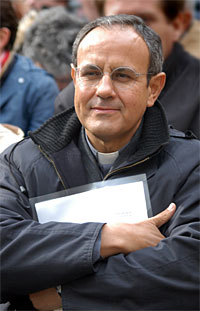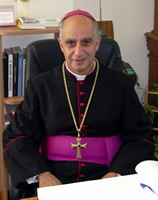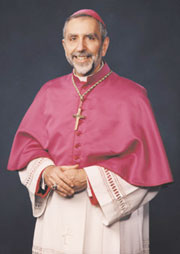 Rev. Father Julián Carrón, President of the Fraternity of Communion and Liberation
Rev. Father Julián Carrón, President of the Fraternity of Communion and Liberation
The Spanish group began by expressing the expectation of the participants relative to this Synod dedicated to the Word of God in the life of the Church. Everyone hopes that this represents an impulse on the evangelizing mission of the Church so that the Word of God reaches everybody, in the various situations that the Church must face, so that men may encounter the living Christ. We propose the following:
It is noted that among Catholics who are unfamiliar with the Old Testament and because of some embarrassment and resistance faced by passages understood with difficulty, these being the controversial questions of divine and human violence, the amorality of certain Biblical figures and a theology which is insufficient concerning the afterworld. Therefore, an adequate Biblical formation should be offered to the faithful, which would help understanding the Old Testament texts in their historical and literary context, but also and especially can facilitate Christian reading as the main hermeneutic key, since these texts acquire and show their full meaning in the New Testament.(cf. DV 16)We propose to move from a "Biblical pastoral" to a Biblical animation of all pastoral actions, that is to say, to place the Word of God as the "rock" that is the foundation, as the living source and as the inspiring breath of all of the life and of all the mission of the Church.(cf. DV 21.24) Between the diverse forms of announcing and transmitting the Word of God particular importance must be given to kerygma.
The task to announce Christ is the responsibility of each baptized person. In addition to the homily, to the actual preaching of the liturgical celebrations, it is necessary to recall the value of the preaching by all Christians in light of Baptism and of Confirmation.
Regarding the celebrations of the Word, many ecclesial communities, particularly those in the urban outskirts and in the rural areas, without Sunday Eucharistic celebrations, find the nourishment for their faith and to give a Christian witness, in the celebration of the Word of God.
In the formation of candidates to priesthood, the Word of God is essential to form the heart of a good pastor, future minister of the Word.
As pertains to the consecrated life, the academic Institutions of Sacred Scriptures, especially those in Rome and in Jerusalem, should be thanked for the great contribution they have made to the formation of exegetes and Biblicists, also the institutions of consecrated life should continue contributing to the study of the Holy Scripture, through these and other institutions, committed to spreading the knowledge of the Bible. Giving worth and careful attention in a particular way to the contemplative life is also indispensable. (cf. Benedict XVI, Angelus Address 18 November 2007). In contemplative life, the Word is welcomed, prayed and celebrated.
We feel a deep concern because of the influence of sects and new religious groups on the Catholic faithful, which sometimes bring them to even abandon the Church. This phenomenon harms our way of living the faith inside the Church and must be perceived as a call to witness it, so that the new life that Christ has brought us may shine on the face of our communities. Greater studies on the sects and the new examples of this phenomenon would be of great help, to face them suitably. In relationships with Islam and in dialogue with its representatives, its concept of the socio-political and judicial order -not always duly differentiated from religious order- should be kept in mind and its concept of marriage and the family where the role and the rights of the women are not dealt with as is foreseen in the doctrine of fundamental human rights and of the family institution and as defined by the Universal Declaration of Human Rights.
Most. Rev. Salvatore Fisichella, President of the Pontifical Academy for Life; Rector of the Pontifical Lateran University
 We have reflected, in a special way on the first four questions raised by the Relatio post disceptationem and arrived at formulating indications for a number of Propositiones which I will sum up as follows.
We have reflected, in a special way on the first four questions raised by the Relatio post disceptationem and arrived at formulating indications for a number of Propositiones which I will sum up as follows.
It is necessary to clarify the sense of the dialogic dimension of Revelation, since the term refers to different dimensions such as "inter-religious dialogue", "ecumenical dialogue", "dialogue with cultures" ... When it is referring to Revelation, it takes on a meaning all of its own: this involves the primacy of the action of God who in freedom comes towards man; this implies that there can never be a parity between the two subjects.
It is vital for the expression Word of God be made unambiguous. This is not easy, but it is necessary. One of the most important considerations of the Synod shows that the Word of God cannot only be identified with the Bible. The Word of God is Christ, the Word of the Father. His preaching, like his acts, have been given to the Church which remains the primary subject that under the action of the Holy Spirit transmits Christ uninterruptedly as the announcement of salvation (DV).
The announcement of the Word of God is the first duty of the Church. An explicit announcement, always and everywhere, that is accompanied by a coherent testimony of living that renders evident the content and reinforces it. What Dei Verbum affirms for the revelation that takes place gestis verbisque intrinsice inter se connexis (DV 2), by analogy is applied to the Church that carries out its evangelizing mission with the announcement of Christ and the testimony of a coherent lifestyle.
It was felt necessary to observe that in a generalized context of secularization - that goes way beyond the Western countries --particular attention be paid, above all, to creating forms of listening so that whoever places themselves in front of the Sacred Scripture knows they are in front of God who is speaking. This demands, furthermore, a formation that allows the discovery of how the reading of the Word converts the heart, opens up to penance and sets out on a path of new life. In this context, the importance of a permanent education is underlined, above all of catechists, that allows the overcoming of the major obstacle of a lack of knowledge of the basic contents of faith, which should cause great alarm to our pastoral action.
The liturgy remains as the privileged place in which the Word of God expresses itself fully. It is necessary to overcome the gap between Bible and Liturgy, Word and Sacrament. This happens to the extent to which it reinforces the idea that the Word of God is Christ Himself in His differentiated presence in the life of His Church; above all in the real presence of the Eucharistic sacrifice; also when the sacraments are celebrated; therefore, when "the Sacred Scriptures are read in the Church, God himself speaks present in his own word" (SC 7). What has to grow, therefore, is the knowledge of a profound unity that reaches its high point in the Holy Eucharist.
The different ways in which Lectio Divina is celebrated pose the question of whether we shouldn't clarify, above all, what is really meant by this action, so as not to leave the wealth of the tradition of the Church Fathers and Medieval teachers in the dark. The growing value that is placed on the Lectio forces us to remember that this is not the only way to meet the Word of God.
Most. Rev. Gerald Frederick Kicanas, Bishop of Tucson, Vice President of Episcopal Conference
 The group suggested that the tone of the exhortation should be hope filled, needs to energize the Church around the Word of God and should be pastoral and missionary.
The group suggested that the tone of the exhortation should be hope filled, needs to energize the Church around the Word of God and should be pastoral and missionary.
The group identified critical areas about which propositions should be developed. A wide range of areas surfaced. First the need to give greater recognition to lay catechists, Catholic School teachers, youth ministers, and lay biblical animators. They need to be better formed and prepared. Second, the need to understand what is attracting people to the Sects and learn from them. Third, [to work on] how preaching might be improved and made more vibrant. Fourth, the need to emphasize and highlight the contemplative dimension. Fifth, [there needs to be a way of] finding structures to bring together exegetes, liturgists, theologians, and bishops. Sixth, the need to give greater emphasis to consecrated life, pneumatology, healing and the Sacrament of Penance, and the use of media.
The dialogic nature of the Word of God needs greater emphasis. There are few opportunities in parishes to teach the necessary theology. Even more important than teaching is modeling a dialogic manner. The group discussed the need to enhance the way we read the Word. There is a need to better form people in the Word through Lectio Divina, dramatization, working with parents who are the primary educators of their children,
There was a mixed reaction to a compendium on preaching. We need to do something but group did not agree that this would be helpful. Suggestion was made for a compendium on helping people read the Word of God.
There was not a strong feeling that there needs to be a revision of the Lectionary. While some Old Testament texts are difficult, they should not be dropped. Perhaps alternatives could be available. There was concern that the question about the relation between exegetes and theologians implies a rift between them. Rather we should encourage cooperation. Scholars should have an opportunity to work in pastoral settings.
Finally the group explored relations with other Christians and with Jews. Concern was raised that Jews sometimes feel that Catholics downplay their positions for dialogue. They do not want that. Bringing the experience of the Synod to other Christian churches might foster communion


Leave a comment